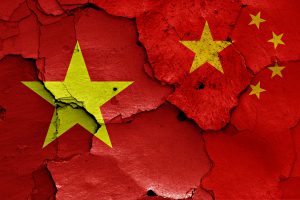Vietnam’s top leader To Lam will visit China next week, his first overseas trip since his recent appointment as the general secretary of the Communist Party of Vietnam (CPV).
According to a report by Reuters, which cited Vietnamese diplomatic sources, Lam will arrive in China on August 18, where he will “meet with President Xi Jinping and other officials over the following two days.”
The trip comes two weeks after the former minister of public security was confirmed as the successor of longtime CPV chief Nguyen Phu Trong, who died on July 19 at the age of 80. This came less than four months after Lam’s appointment as Vietnam’s president, after Vo Van Thuong was forced to stand aside as part of the country’s wide-ranging anti-corruption campaign – a campaign in which Lam, as minister of public security since 2016, has played a prominent part.
It remains unclear whether Lam will hold the presidency and the party leadership until the next CPV National Congress in early 2026, or whether an alternative president will be chosen in the coming months. (Reuters’ report suggested that he may relinquish the post when parliament meets for a regular session in October.) Since his appointment as president, Lam has visited neighbors Laos and Cambodia – “fraternal” Laos is often the first destination for newly inaugurated Vietnamese presidents – but the China visit will be the first since Lam’s elevation to the party leadership.
That Lam would choose to visit China on his first foreign trip as party chief is no surprise. The CPV and its Chinese counterpart enjoy a political relationship dating back to the Viet Minh’s war against the French, and the two nations enjoy a uniquely intimate, if often fraught, relationship. China was the first nation to establish a comprehensive strategic partnership with Vietnam, in 2008, and has customarily been the first foreign destination of newly appointed CPV general secretaries. Trong made his inaugural visit there as party chief in October 2011; he first met China’s leader Xi Jinping, then vice president, in December of that year.
The CPV and Chinese Communist Party (CCP) also share a number of common interests relating to the preservation of their respective monopolies on power, and the desire to forestall a Western-influenced “peaceful evolution” away from communist rule. This has provided ballast to bilateral relations, even as these have been buffeted by tensions over the South China Sea, including the tumultuous HD-981 oil rig incident in 2014. Indeed, an agreement signed during Trong’s visit to China in 2011 has functioned as a “de facto ‘code of conduct’” between the two sides, preventing maritime friction from escalating into conflict.
Lam’s visit is a sign that Hanoi’s relationship with Beijing, underpinned by the inescapable proximity of its giant northern neighbor, remains the challenge that Vietnam’s pragmatic form of “bamboo diplomacy” has been designed to offset. This has seen Vietnam broker comprehensive strategic partnerships with six other nations – Russia (2012), India (2016), South Korea (2022), the United States (2023), Japan (2023), and Australia (2024) – since 2008, with several more reportedly in the pipeline. Coming amid this diversifying trend, Lam’s visit will reaffirm to China’s leaders both the priority that Hanoi places on its relations with Beijing and of its fundamentally peaceful intentions.
After Lam’s appointment, China’s President Xi Jinping sent his a congratulatory message in which he expressed his readiness to work together “in building a China-Vietnam community with a shared future, jointly carry forward traditional friendship, consolidate mutual political trust, deepen strategic communication, and promote practical cooperation.”

































